'It’s a dirty job, these are the men who do it': A day in the life of Cork city's street cleansing department
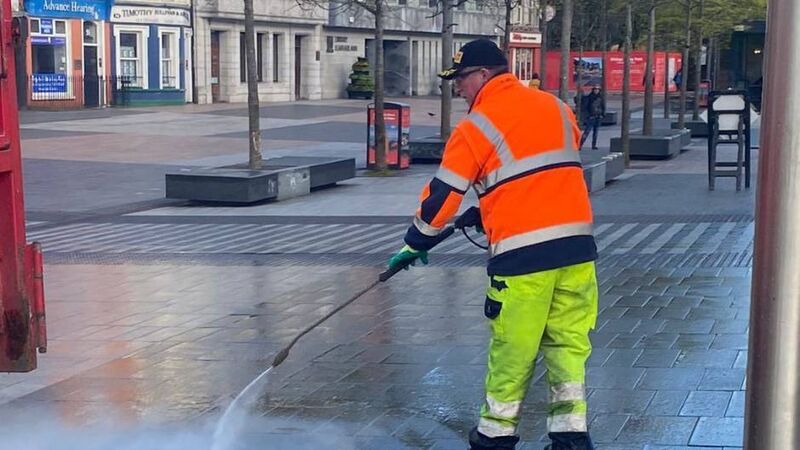
David Dennehy of Cork City Council's cleansing department, power washing on the Grand Parade.
The sky is still golden over the bottom of Oliver Plunkett Street as Chris Broderick works his way toward the Grand Parade, where he’ll turn around and work back, cleaning the 'offs', the side streets leading to Patrick Street and the South Mall.
Chris is from Farranree and he has worked with Cork City Council’s cleansing department for about 25 years. He covers a different part of the city every day, only finding out where he’s heading that morning.
Asked if there’s a best part and a worst part of the city, he says it varies depending on the time of day and the time of week.
He said the single item making up most of the refuse on Cork’s streets is the cigarette butt.
“Cigarette butts are the big thing. With most other things, the new bins the council put in recently are starting to make a difference. People are starting to put stuff into the bins, but if you look around any morning all you see is cigarette butts everywhere.
“The other thing are those bloody vapes. People are taking them out of the packets, using them, and then throwing them away onto the pavement.” Cigarettes are still the main source of litter in the city, Chris says, and he says a little consideration would go a long way toward tackling the problem.
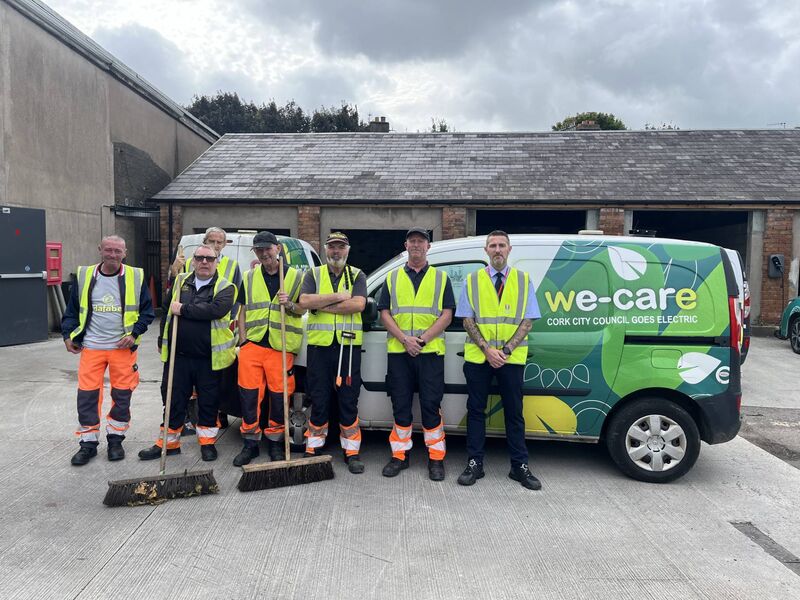
“I think if pubs and shops and restaurants had buckets outside their premises, people would stick the butts in, but when people come out for a for a drink or take a break from their meal, they’re throwing them on the ground.”
When asked for a comment, the Cork branch of the Vintners Federation of Ireland referred to its national office, where a spokesperson said that while most publicans are litter conscious, sometimes customers can be a little careless after drink.
Regardless, they said, it was incumbent upon all vintners to be, “good citizens the same as everyone else and they should be part of the solution rather than part of the problem”.
The spokesperson added that, if the city council’s cleansing department was experiencing an issue with cigarette butts outside pubs, the federation would be happy to send out “a gentle reminder” to its members.
The day shift of Cork City Council’s cleansing department works from 6am to 2pm, while the evening shift is 2pm to 10pm, with 12 men working in the city centre – the cleansing department staff is currently all male – working across the day.
Eugene Coffey has been with the council for almost 30 years. On the morning we meet him, down in Parnell Place, he is working along the Boardwalk, Lower Oliver Plunkett Street, Anderson’s Quay, and the area around the bus station.
“There’s more footfall in the summer, the winter less so, but it still can be dirty.”
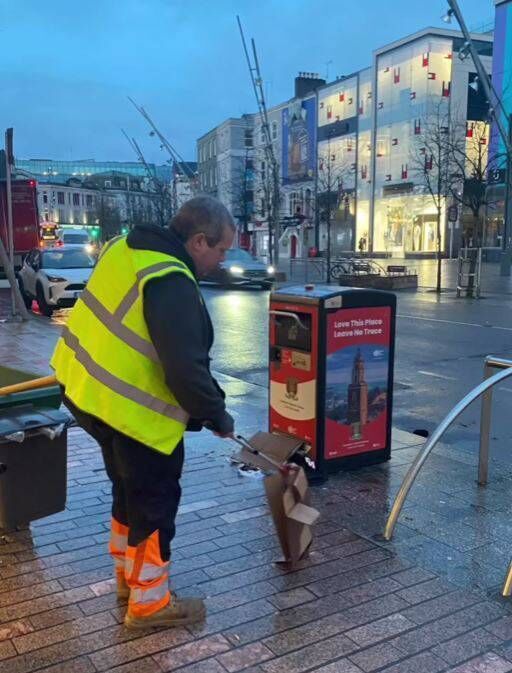
With matches and concerts, he says, it depends on who is attending.
“The older generation is a bit tidier than the younger generation. Anyone 50 years or older, I suppose they tend to think a bit more, but we were all young once.”
Up on Cook Street, we meet John Coughlan from the council’s parks department. He’s out since about 5.30am, watering planters and flowerbeds.
“I’m here about 29 or 30 years now. I’m originally from the northside but I’m living down in Blackrock,” he says.
He says the planters are great, but adds they get a fair bit of abuse, with people using them as ashtrays and leaving pint glasses in them.
“And they get picked as well for plants, which is desperate. People passing at night might pick a plant and throw them across the street.
“The planters sometimes get tipped over, but in fairness the lads from the cleansing department give us a hand and we’d get it cleaned up before people are even up and about.
John says he thinks people tend to take the cleansing staff for granted.
“They think the city is the way it is naturally, they don’t appreciate that there’s a day’s work done cleaning the place before anyone is in town at all.”
A little later in the morning, in the cleansing department canteen in the Eglinton Street depot, a copy of sits on the table as Dave Dennehy and Joe Cummins sit down for a chat over a cup of tea.
Dave is in the job about 24 years and Joe 28 years.
Dave says he and Joe do maintenance around the city, taking down graffiti, and power-washing streets and pavements. They speak sensitively and matter-of-factly about the after-effects of rough sleeping in the city.
“Any doorways that might have human feces in them, we would clean it up, any illegal dumping as well,” Dave says.
“They have an industrial machine which they use for cleaning them.”
Joe says that if they find sleeping bags which are badly soiled they just dump them.
“Sometimes people might see us taking away a sleeping bag and think we’re being unfair to some poor soul sleeping rough. But they don’t realise that most of the time we’re only taking it to be cleaned.
“If we find a sleeping bag folded down, in a doorway, say, we leave it, because we know that person is coming back and that sleeping bag is their property.”
They both say syringes have become an issue all over the city. “They would be a problem, all right. You could find them anywhere,” Dave says.
Joe agrees:
All syringes are safely put in a separate container back at Eglinton Street, and when that container is full, they are sent away for incineration.
Asked how many needles are found in the city every day, the men say it’s hard to put a specific figure on it.
“It all depends. Us, specifically, it could be one or two a day we’re going to get,” Dave says. “The lads that are sweeping, they could come across five or six in any one street. We’ve often come across needles that have blood in them.” Joe says they were given training about how to dispose of syringes and they are extremely careful around them. “We have specific gloves that we wear too,” Dave adds.
The conversation turns to cigarette butts, and Joe agrees with Chris Broderick’s earlier point that they are a scourge on the city, and a few well-placed buckets might help a lot.
“I make a point specifically about the Mercy Hospital over,” Joe says.
When asked about the automated message playing outside the hospital saying it is a non-smoking area, they both laugh. “He might as well be talking to himself, that robot, because no-one is paying him a blind bit of notice,” says Joe.
Accepting that the hospital might have an issue with being seen to condone smoking, they both say a receptacle for cigarette butts would help a lot.
A spokesperson for the Mercy University Hospital (MUH) said the hospital is committed to creating a healthier, tobacco free, clean environment for its staff, patients and visitors.
“However, it should be noted that the streets and pathways adjacent to the hospital buildings are public and therefore outside of the hospital’s direct management.
“A bin is provided in the area and the staff of the MUH regularly clean and maintain the area as far as is practicable,” the spokesperson said.
In the Eglinton Street canteen, Dave Dennehy and Joe Cummins finish their tea and head back out to work. The humour is good, but they’re under no illusions.
“Call it what it is, it is a dirty job,” says Joe. “By the time people get up and start coming to work, we could have the whole city clean. And people could say, ‘sure there’s no dirt in the city’.
“They should see what we see some mornings on our own way in to work, what we have to face.”

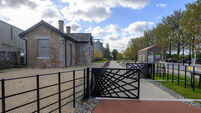
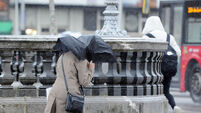
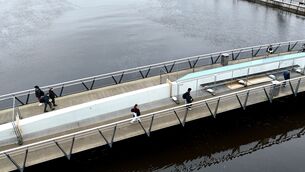



 App?
App?


